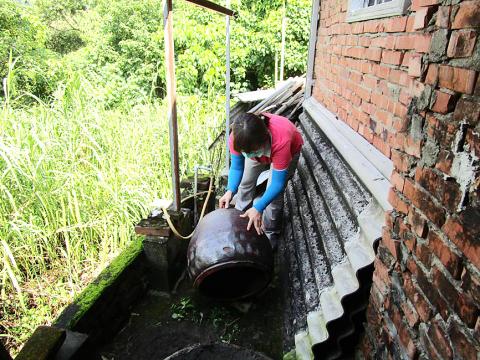The Centers for Disease Control (CDC) yesterday confirmed the ninth indigenous case of dengue fever in Tainan, saying it suspects that the virus might have spread farther, as the latest case involves a person who had not been to areas linked to previous cases.
An 89-year-old man living in the mountainous Ronghe Borough (榮和) of Zuojhen District (左鎮) developed a fever on Wednesday, the centers said.
On Friday, he was taken to a hospital for a scooter-related injury and tested positive in a rapid dengue fever screening before being confirmed to have contracted the disease, the centers said.

Photo provided by the Tainan Public Health Bureau
The man usually stays at home and tends his vegetable garden and he had not traveled abroad or visited areas linked to the eight previous indigenous cases, the CDC said, adding that he visited Shanhua District (善化) on Sunday last week.
Disease prevention personnel would disinfect the man’s home and garden, the centers said, adding that it is investigating where he might have contracted the disease and whether the virus is the same strain as the previous cases.
CDC Deputy Director-General Chuang Jen-hsiang (莊人祥) said a possible source of infection could be someone visiting Zuojhen before the onset of symptoms, or there could be local residents who contracted the disease abroad, but did not show symptoms.
A total of 48 indigenous dengue fever cases had been reported nationwide as of yesterday — 39 in Kaohsiung and nine in Tainan — and there were 209 imported cases, marking the highest number for the period in 10 years, the CDC said.
As heavy rain or showers have been forecast for most of southern Taiwan this week, the centers urged people to remove standing water in containers or drenches in their living environments following rain to eliminate breeding grounds for mosquitoes, and immediately seek medical help if symptoms of fever, headache, pain behind the eyes, rashes, or muscle and joint pain occur.
Dengue fever is a mosquito-borne tropical disease.
Symptoms typically begin three to 14 days after infection.

Alain Robert, known as the "French Spider-Man," praised Alex Honnold as exceptionally well-prepared after the US climber completed a free solo ascent of Taipei 101 yesterday. Robert said Honnold's ascent of the 508m-tall skyscraper in just more than one-and-a-half hours without using safety ropes or equipment was a remarkable achievement. "This is my life," he said in an interview conducted in French, adding that he liked the feeling of being "on the edge of danger." The 63-year-old Frenchman climbed Taipei 101 using ropes in December 2004, taking about four hours to reach the top. On a one-to-10 scale of difficulty, Robert said Taipei 101

Nipah virus infection is to be officially listed as a category 5 notifiable infectious disease in Taiwan in March, while clinical treatment guidelines are being formulated, the Centers for Disease Control (CDC) said yesterday. With Nipah infections being reported in other countries and considering its relatively high fatality rate, the centers on Jan. 16 announced that it would be listed as a notifiable infectious disease to bolster the nation’s systematic early warning system and increase public awareness, the CDC said. Bangladesh reported four fatal cases last year in separate districts, with three linked to raw date palm sap consumption, CDC Epidemic Intelligence

Taiwanese and US defense groups are collaborating to introduce deployable, semi-autonomous manufacturing systems for drones and components in a boost to the nation’s supply chain resilience. Taiwan’s G-Tech Optroelectronics Corp subsidiary GTOC and the US’ Aerkomm Inc on Friday announced an agreement with fellow US-based Firestorm Lab to adopt the latter’s xCell, a technology featuring 3D printers fitted in 6.1m container units. The systems enable aerial platforms and parts to be produced in high volumes from dispersed nodes capable of rapid redeployment, to minimize the risk of enemy strikes and to meet field requirements, they said. Firestorm chief technology officer Ian Muceus said

MORE FALL: An investigation into one of Xi’s key cronies, part of a broader ‘anti-corruption’ drive, indicates that he might have a deep distrust in the military, an expert said China’s latest military purge underscores systemic risks in its shift from collective leadership to sole rule under Chinese President Xi Jinping (習近平), and could disrupt its chain of command and military capabilities, a national security official said yesterday. If decisionmaking within the Chinese Communist Party has become “irrational” under one-man rule, the Taiwan Strait and the regional situation must be approached with extreme caution, given unforeseen risks, they added. The anonymous official made the remarks as China’s Central Military Commission Vice Chairman Zhang Youxia (張又俠) and Joint Staff Department Chief of Staff Liu Zhenli (劉振立) were reportedly being investigated for suspected “serious